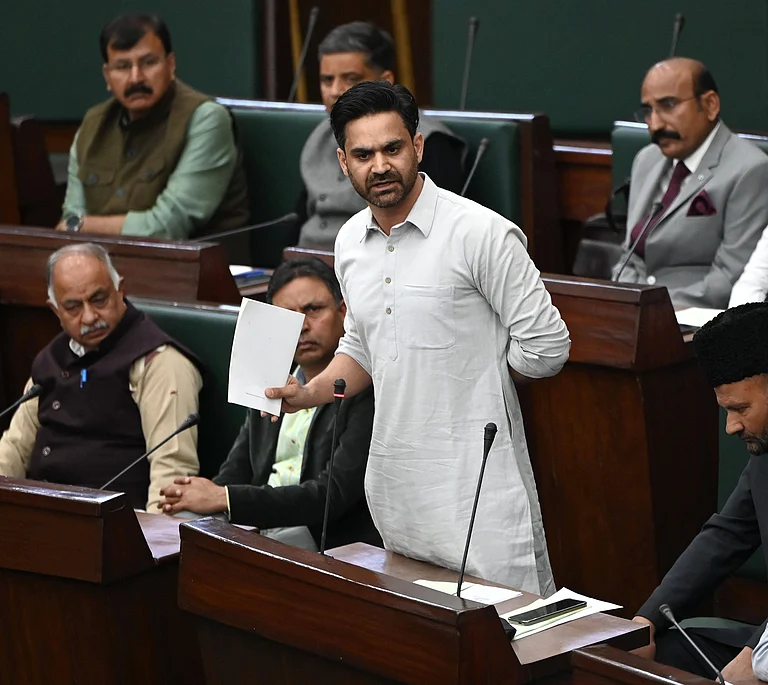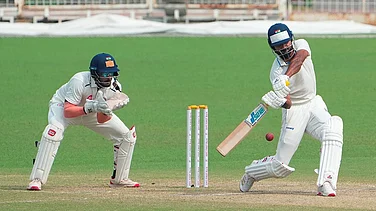AT the end of every Ashes tour in the 1990s, it has become an Australian custom to have a quiet chuckle at the English. Not because they have lost, but because their consolation victories, in one-day series or in dead Test matches, inevitably lead them into a fool's paradise that they inhabit until the next series. It is a trait of unsuccessful teams to make too much of these dollops of cream on the overall cow pat.
While the Australians deserve commendation for their phenomenal improvement to beat India in the one-day final at Delhi, and for their Test match win in Bangalore, the winter's reflections on this tour should not be glossed. To let two belated victories obscure a lacklustre tour would be to follow a desperate path better suited to more pessimistic nations. In the one-day series, Australia won three out of five matches, two against Zimbabwe. Had a higher-ranked third team been invited into the triangle, it would be hard to imagine Australia making the final.
After Australia's thumping by India in Kanpur, I asked Steve Waugh if, in one-day cricket, winning tournaments was what counted,and qualifying games were more or less meaningless. He said no, that as an international cricketer he wanted to win every match he played, and a 50 per cent winning record was unacceptable. Since he became captain, Australia won 10 matches and lost 10. In his own words, that is unacceptable.
Whatever the feelings about the one-day tournament, the enduring images of this tour will be Sachin Tendulkar depositing his second ball from Shane Warne into the mid-wicket Mumbai crowd; Navjot Singh Sidhu charging down the wicket and pulverising Australia's bowlers; Anil Kumble's mesmeric bounce and variation; Javagal Srinath's first over in Calcutta; and the many Tendulkar-Mohammed Azharuddin batting exhibitions.
Despite Michael Kasprowicz's improvement, Ian Healy's excellence and some other good one-off performances, Australia's highlights on this tour tended to be reactive, not commanding. It wasn't expected. India had given no indication it could beat the world champion so thoroughly. It is the suddenness of this reversal that demands explanation. Australia has put forward some reasons, and some excuses, for what has happened. They vary in credibility, and deserve a rating as to how they make sense of the tour's results.
INJURIES: A three-star reason. Geoff Marsh said Australia was "killed by injuries", essentially those to Glenn McGrath and Jason Gillespie. Fast-bowling spearheads are of obvious importance to cricket teams. Warne is accustomed to bowling at the middle-order, not openers. Fast bowlers are leaders around which teams rally.
But the argument that McGrath's or Gillespie's presence would have changed the outcome of the Test series would be sustainable only if the series had been lost narrowly. It wasn't. Australia took only 19 wickets in the first two Tests. Could McGrath have taken another 21? Could he have lifted the team single-handedly?
It is comforting to say McGrath would have made the difference, but if Taylor and Steve Waugh were not prepared to offer McGrath's absence as an excuse on February 21, they should not
INDIA'S PLAY: A five-star reason. For some years, India has been international cricket's underperformers. With batsmen such as Tendulkar, Azharuddin, Sidhu and Rahul Dravid, a top-class wicketkeeper in Nayan Mongia, and bowlers such as Kumble and Srinath, India should be one of the best two or three teams. Political interference, personality conflicts and regional divisions hampered them until now. It was Australia's misfortune to run into a united India. With Azharuddin as captain and Tendulkar free to bat, it was a harmonious team. It played to its potential. Warne did not bowl badly, but, as he said, the Indian batsmen "hit through the line of the ball and make it tough for spinners, no matter how good or bad you are".
When players of the calibre of Tendulkar and Azharuddin thrash your bowlers, you have to acknowledge their superiority. The Indians had done their homework on the Australians. The Australians will be better prepared next time.
For this tour, a measure of honour goes to both teams. It has provided interesting and sometimes exhilarating cricket. The Australians squeezed as much as they could from resources depleted by tiredness, injury and frustration. They won a one-day series and their first Test here since 1969. But India was the better team, in both forms of the game, and the composition of its team suggests it will take a more elevated position in the world rankings.
UMPIRING: A one-star reason. After the last day of the first Test in Chennai, when some Australian batsmen received poor decisions, Taylor refused to blame the umpires. He said that when one team is on top, as India were, crowding the bat and appealing often, the decisions usually favour them. It has happened Australia's way often enough. Taylor also said that if cricketers were going to spend their time grizzling about the umpiring and developing a victim mentality, they have lost the battle before they take the field. He was right, but he was almost alone. Australian players complained about the umpires and were convinced they were being persecuted from the first match of the tour.
They failed to take into account different umpiring customs in India. Umpires are not duty-bound to explain their decisions to players, and the Australians had been spoilt by umpires doing so elsewhere. So when Indian umpires ignored players' requests for explanations, the players were aggrieved by what they saw as arrogance. Yet the umpires were acting within their rights.
The Australians have also been spoilt by Australian umpires' liberality on leg-before wicket decisions. When they found Indian umpires less willing to favour the bowlers, the Australians were infuriated. They muttered that the local umpires were incompetent and biased. But overall, there were no more poor decisions on this tour than in a regular Australian summer. If there was incompetence, it was shared around. Indeed, Australia may not have made the one-day final if an atrocious run-out decision had not gone its way, against Zimbabwe's Andy Flower.
FRUSTRATION WITH INDIA: A three-star reason. The disgruntlement about umpiring could only flourish in an atmosphere of general distrust. The Board of Control for Cricket in India is an inscrutable organisation that has no full-time employees. Its workings are incomprehensible to Australian squad members who like to be forthright and transparent in their dealings.
The BCCI failed to answer many of the Australian management's requests, failed to honour agreements—or what the Australians believed were agreements—and failed to conduct its business with consistency. This, you might say, is simply the way things work in India. But a fatalistic shrug of the shoulders is easy if you're going through India as a tourist, less so if you're trying to run a multi-million-dollar operation.
Indian cricket is racing forward, but its administrators have been left decades behind. The Australians' frustration was an accumulation of small things. It was not ameliorated, for the cricketers at least, by any fascination with the country. Hundreds of thousands of Australian tourists love India. But, if it is not your cup of char, it's not your cup of char. The Australian cricketers fall into that category. Attempts to break through the cultural barrier and see some of the country foundered on a wall of autograph-hunters and well-meaning but over-officious helpers. India is no place for a superstar from an Aussie suburb.
FATIGUE: A four-star reason. The triumph in the Delhi one-day is the exception that proves this argument. When a team is tired, it loses consistency. It cannot win matches day in and day out. If it is a smart team, it'll reserve its best for moments that count. Australia is a smart team. Steve Waugh said after the final that it had played "with intensity and energy, which had been missing". "It shows we can win under pressure, which is the big thing at this level. The main objective is to win the big games, which we've done over the last six months."
The Australian Cricket Board should be happiest of all, for its team has saved it from embarrassment. Since August 1996, Australia has played 24 Tests and 47 limited-overs internationals, plus tour matches and domestic cricket, with only two months of rest. That is too much. Fatigue was Taylor's principal explanation for the Test series loss here, and it is a fair one. Had Australian bodies and minds grown stale earlier, and had the series against England and South Africa been lost, the ACB would have been portrayed as slave-drivers.
(By arrangement with 'The Sydney Morning Herald')


























